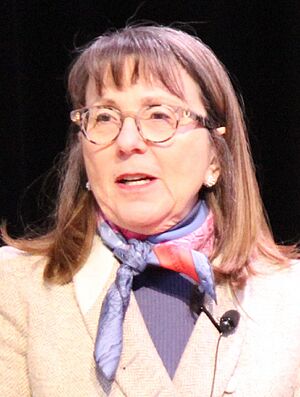Lisa Feldman Barrett facts for kids
Quick facts for kids
Lisa Feldman Barrett
|
|
|---|---|

Barrett in 2024
|
|
| Born | 1963 (age 62–63) Toronto, Ontario, Canada
|
| Nationality | Canadian |
| Citizenship | United States, Canada |
| Alma mater | |
| Known for | Theory of constructed emotion |
| Spouse(s) | Daniel J. Barrett |
| Awards |
|
| Scientific career | |
| Fields | |
| Institutions |
|
| Thesis | On the failure to differentiate anxiety and depression in self-report (1992) |
| Doctoral advisor | Mike Ross |
| Doctoral students | Tamlin Conner |
Lisa Feldman Barrett is a Canadian-American psychologist. She is a top professor of psychology at Northeastern University. There, she studies how our brains create emotions. She also helps lead a special lab that looks at emotions from many angles.
Dr. Barrett has received the highest science awards in psychology. These include the William James Fellow Award and the Award for Distinguished Scientific Contributions. She also received a Guggenheim Fellowship, which is a special award for people doing important work. She helped start the journal Emotion Review and co-founded the Society for Affective Science.
Contents
About Lisa Feldman Barrett
Lisa Feldman Barrett was born in 1963 in Toronto, Canada. Her family didn't have much money, and she was the first in her family to go to university. She studied at the University of Toronto and then got her Ph.D. in clinical psychology at the University of Waterloo. She wanted to become a therapist.
During her studies, she tried an experiment eight times, but it never worked as she expected. She then realized her "failures" were actually showing something new. This discovery changed her path. She decided to focus her life's work on understanding how emotions are made in the brain.
After her training, she became a professor at several universities. Over 20 years, she moved from studying clinical psychology to looking at emotions from different science viewpoints. These included social psychology and cognitive science.
Dr. Barrett is inspired by famous thinkers like William James and Charles Darwin. From 2018 to 2025, she was one of the most-cited scientists in the world. This means many other scientists used her work in their own research.
Besides her university work, Dr. Barrett has written two popular science books. These are How Emotions are Made (2017) and Seven and a Half Lessons About the Brain (2020). Her TED talk about emotions was also very popular in 2018.
How We Study Emotions
Dr. Barrett's early research looked at how emotions are structured. She created new ways to study how people experience feelings. Her lab, the Interdisciplinary Affective Science Laboratory, studies emotions from many different angles. They use ideas from social science, brain science, and even language. They also explore how emotions affect things like what we see.
Before joining Northeastern University in 2010, she taught at Boston College and Pennsylvania State University. One of her notable students is Tamlin Conner.
Her research has explored big questions about emotions, such as:
- What are the basic parts of our emotional lives?
- Why do we easily see anger or sadness in ourselves and others, but scientists find it hard to define them clearly?
- How do language and what we know affect how we see emotions?
- Are there real differences in how men and women experience emotions?
The Theory of Constructed Emotion
Dr. Barrett developed her main idea, called the Theory of Constructed Emotion, during her graduate studies.
She believes that emotions are not the same for everyone. They can change from one culture to another. She says that emotions are not just "triggered" by something. Instead, "you create them." They come from a mix of your body's feelings, your brain learning from its environment, and your culture and how you grew up.
She also points out interesting facts about how we show emotions. For example, she suggests that smiling became popular in the 1700s when dental care became more common.
Awards and Achievements
Lisa Feldman Barrett has received many important awards for her work:
- 2007–2012: NIH Director's Pioneer Award, for studying how the brain creates emotion.
- 2008: Elected Fellow, American Association for the Advancement of Science.
- 2012: Elected Fellow, Royal Society of Canada.
- 2013: Elected Fellow, Society of Experimental Psychologists.
- 2018: Elected Fellow, American Academy of Arts and Sciences.
- 2019: Guggenheim Fellowship in neuroscience.
- 2019–2020: President of the Association for Psychological Science.
- 2021: APA Award for Distinguished Scientific Contributions, American Psychological Association.
- 2025: William James Fellow Award, Association for Psychological Science.
Books by Lisa Feldman Barrett
- Seven and a Half Lessons About the Brain. 2020.
- How Emotions are Made: The Secret Life of the Brain. 2017.
- Handbook of Emotions, Fourth Edition. 2018.
- The Psychological Construction of Emotion. 2014.
See also
 In Spanish: Lisa Feldman Barrett para niños
In Spanish: Lisa Feldman Barrett para niños
- Sapir–Whorf hypothesis
- List of University of Waterloo people
 | Percy Lavon Julian |
 | Katherine Johnson |
 | George Washington Carver |
 | Annie Easley |

